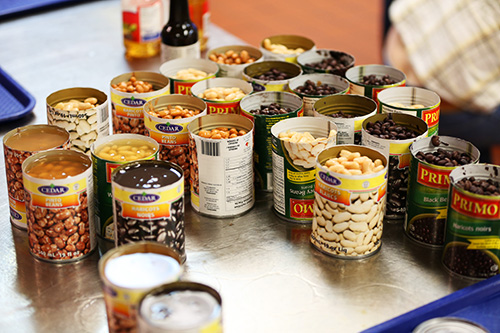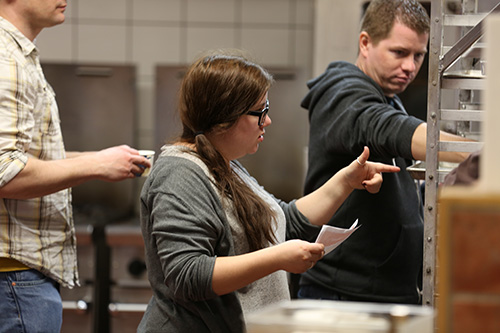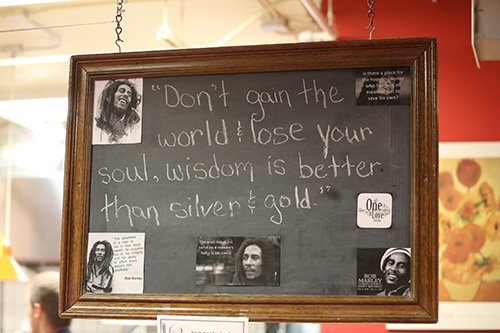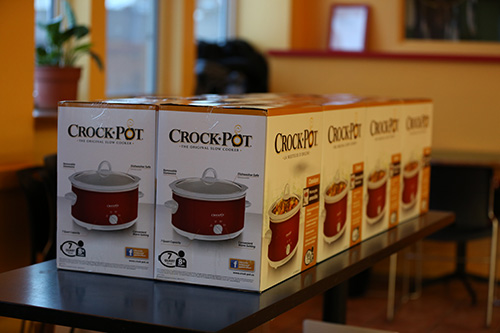"A building full of amazing people solving problems is one of the most powerful things that exists on this planet."
Tobias Lütke, CEO of Shopify, said that on a tour of Waterloo Region in October. He was explaining why he doesn't like his staff to work remotely, but he touched on something much more profound: that a tech company is an incredibly powerful instrument for changing the world.
Tech companies often impact a relatively narrow, professional class of people: they make a faster, easier, or better-organized way to track analytics, or manage orders, or boost productivity. The list goes on, but rarely do these kinds of innovations touch the lives of the most stressed, vulnerable members of society.
So what happens when a tech company lifts its gaze from the day-to-day and starts solving problems for the less fortunate? I headed to St. John's Kitchen in Kitchener last week for Netsuite's "Slower Cooking for Faster Meals" to find out.
Slower Cooking for Faster Meals is a SuiteImpact project from Netsuite Waterloo led by Senior Software Developer Ian Ring. The program offers qualified participants a crockpot, a recipe book, a kit with kitchen tools and spices, and a cooking class that yields a week's worth of food. Netsuite Waterloo has helped other charities in the past — painting fences at an equestrian therapy farm, holding technology classes for kids, and making blankets for traumatized babies — but Slower Cooking for Faster Meals is the first project they're building from scratch

Along with the tools of the trade, Netsuite provided a week’s worth of meal
ingredients and dinner for participants on the night of the workshop
(Photo: Phil Froklage).
“The goal will be for participants to leave with seven meals that can be pulled out of the freezer each morning, emptied into a slow cooker, turned on before leaving for work, so they can come home in the evening to a hot nutritious meal large enough to feed the entire family,” Ring wrote on the Netsuite Waterloo blog.
"It's not like we used any special technology to get this done,” Ring told me when I asked if the makeup of his team (technology professionals) shaped his project.
"I think the way Netsuite builds teams in the company contributed in a big way to making this successful," he said. "The amount of effort and co-operation between the planners and volunteers was remarkable: getting groceries and equipment, planning the curriculum, researching and testing recipes... Just a ton of work, and they showed great communication and co-operation.
“We're used to doing that together already. We build software as a team, so we have a shorthand, and we know when we can count on someone to do something. I think that came into play in a big way making this event happen.”
Watching the team work in the kitchen, I can't deny the claim: Ring's team hums like a well-oiled machine with the kind of trust and communication that only exists between seasoned veterans. But logistics aside — and whether Ring sees it or not — I think all of Netsuite’s approaches to Slower Cooking for Faster Meals scream "tech.

Katie Tregonning – a foodie and culinary school graduate who works at
Netsuite – kept the kitchen running smoothly and taught the evening’s
lesson (Photo: Phil Froklage).
Take the problem itself. Ring's team decided they wanted to use their volunteer hours — time Netsuite has set aside like vacation or sick days — to aid the less fortunate. Ring says the team soon realized that it "couldn't solve poverty," so it started on the next best thing, nutrition.
With an area of focus, the team started a discovery process. Calling up partners (like the Working Centre and St. John's Kitchen) around Waterloo Region that help low-income earners, it developed a list of challenges people face trying to feed their families on a budget. The team laid those out like a series of logical axioms:
- Convenience: With unpredictable shift work, challenging child-care needs and complex schedules, families under stress don't have a lot of time for cooking. Cheap, prepared restaurant meals, like fast food, are just easier.
- Risk of failure: Unlike a wealthy family, a stressed family can't just "mess up dinner." If you burn the ingredients, no one eats. It's a lot safer to pick up fast food. At least precious calories for you and your children are guaranteed.
- Skills: As Ring puts it, "when you get a bag of dried green lentils from the food bank, what do you do with that?" I don't know, either. The basics of cooking aren't always intuitive and, increasingly, aren't passed from one generation to the next, low-income families included.
- Equipment: Cooking for yourself is a lot cheaper than eating out. But if the cost of tools is prohibitive, cooking for your family becomes a luxury good.

A chalkboard inside St. John’s Kitchen in downtown Kitchener
(Photo: Phil Froklage).
With a clear scope of the problem, Ring's team did the next thing great technologists do — find the perfect tool to solve it in the cheapest, most efficient way. Ever alert to solutions from unexpected places, it discovered the perfect tool was the humble slow cooker.
"With a crockpot you just dump everything into it, let it run for six to 10 hours, and it's going to be fine at the end of the night when you've had a very long day and you're finally ready to eat,” said Ring. “It’s easy to use, convenient, it can be run cheaply . . . It's good for a lot of reasons."
Simply by noticing an overlooked solution, Ring and the folks at Netsuite cracked the problem of the fast-food cycle and showed eight families the path to a more sustainable way to eat. With a successful pilot under their belt, Ring's team is hoping to scale their solution to even more stressed families in the future

The Crockpot’s unexpected killer app: feeding low income families
(Photo: Phil Froklage).
I'm left wondering what would happen if more companies in the region followed Netsuite’s example.
If Lütke is right, the most powerful thing on the planet is a building full of talented people solving problems. With the second-highest density of startups per capita on Earth, Waterloo Region has a lot of buildings full of talented people.
If those people turned just a fraction of their collective attention to the needs of the less fortunate, Waterloo Region could be an engine of social change — and stand as an example to Canada of the true power technology holds for improving our world.
I see and hear that . . . Electronic trio Operators play The Starlight (47 King St. N., Waterloo) tonight at 8 p.m. Tickets are $13 . . . If you’d like to survive the zombie apocalypse you’ll need the information at Seedy Saturday at The Kitchener Public Library (85 Queen St. N., Kitchener) on Saturday, Feb. 20 from 9 a.m. to 2:30 p.m. Expert gardeners and horticulturalists will give you the tools you need to rebuild civilization. Of course, every Saturday is Dine and Dash… To the Movies! From the Apollo Cinema. They’re playing some bonkers good movies right now.

